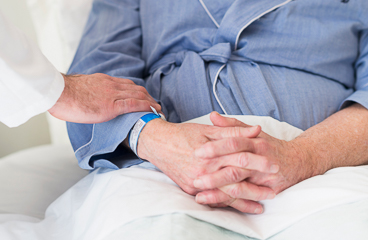
Overview
Bladder cancer occurs when abnormal cells grow out of control in the bladder. These extra cells grow together and form masses, called tumors. Bladder cancer is more common in older people.
Treatment may include surgery to remove the tumor or to remove part of the bladder. If the tumor is large and growing into the muscle layer of the bladder, the entire bladder may be removed. Some people get treatment with medicine inside the bladder that activates immune cells in the bladder. You may also have radiation or chemotherapy to kill the cancer cells. Other treatment options include targeted therapy or immunotherapy.
Follow-up care is a key part of your treatment and safety. Be sure to make and go to all appointments, and call your doctor if you are having problems. It's also a good idea to know your test results and keep a list of the medicines you take.
How can you care for yourself at home?
- Take your medicines exactly as prescribed. Call your doctor if you think you are having a problem with your medicine.
- Eat healthy food. If you are not hungry, try to eat food that has protein and extra calories to keep up your strength and prevent weight loss.
- Get some physical activity every day, but do not get too tired.
- Get enough sleep and take time to do things you enjoy. This can help reduce stress.
- Think about joining a support group. Or discuss your concerns with your doctor, counselor, or other health professional.
- If you smoke, ask your doctor about aids to stop smoking.
- If you are vomiting or have diarrhea:
- Drink plenty of fluids to prevent dehydration. Choose water and other clear liquids. If you have kidney, heart, or liver disease and have to limit fluids, talk with your doctor before you increase the amount of fluids you drink.
- When you are able to eat, try clear soups, mild foods, and liquids until all symptoms are gone for 12 to 48 hours. Other good choices include dry toast, crackers, cooked cereal, and gelatin dessert, such as Jell-O.
- Take care of your urinary tract to prevent problems such as infection, which can be caused by bladder cancer and its treatment. Limit drinks with caffeine, drink plenty of fluids, and urinate every 3 to 4 hours.
- If you have not already done so, prepare a list of advance directives. Advance directives are instructions to your doctor and family members about what kind of care you want if you become unable to speak for yourself.
When should you call for help?
Call your doctor now or seek immediate medical care if:
- You have pain that does not get better after taking pain medicine.
- You have symptoms of a kidney infection. These may include:
- Pain or burning when you urinate.
- A frequent need to urinate without being able to pass much urine.
- Pain in the flank, which is just below the rib cage and above the waist on either side of the back.
- Blood in your urine.
- A fever.
Watch closely for changes in your health, and be sure to contact your doctor if:
- You do not get better as expected.
Where can you learn more?
Go to http://www.healthwise.net/patientEd
Enter M796 in the search box to learn more about "Bladder Cancer: Care Instructions".
Current as of: October 25, 2024
Author: Ignite Healthwise, LLC Staff
Clinical Review Board
All Ignite Healthwise, LLC education is reviewed by a team that includes physicians, nurses, advanced practitioners, registered dieticians, and other healthcare professionals.

